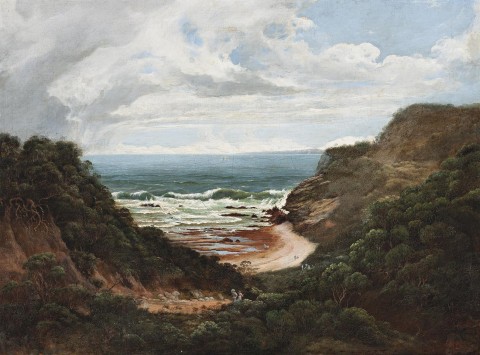OCEAN BEACH, SORRENTO, 1876
ISAAC WHITEHEAD
oil on canvas
80.0 x 108.0 cm
signed and dated lower right: I Whitehead 1876
Private collection
Christie’s, Melbourne, 28 April 1976, lot 402
Private collection, Melbourne
Thence by descent
Private collection, Sydney
The Sixth Exhibition of the Victorian Academy of Arts, Victorian Academy of Arts, Melbourne, 1876, cat. 62 (as ‘Ocean Beach’)
Sixth Annual Exhibition of Works of Colonial Art, New South Wales Academy of Art, Sydney, 1877, cat. 31 (as ‘Ocean Beach, Sorento [sic] Bay, Victoria’)
Exposition Universelle de Paris, Paris, 1878, first group, class 1, cat. 7
19th & 20th Century Australian Painting, Sculpture and Decorative Arts, Lauraine Diggins Fine Art, Melbourne, 1 May – 7 June 1996, cat. 3 (illus. in exhibition catalogue) (label attached verso)
‘Victorian Academy of Arts’, Argus, Melbourne, 10 April 1876, p. 7
Thomas, D., Australian Art in the 1870s, Art Gallery of New South Wales, Sydney, 1976, p. 46
Sheen, P., ‘Whitehead, Isaac’, in Kerr, J., The Dictionary of Australian Artists: Painters, Sketchers, Photographers and Engravers to 1870, Oxford University Press, Melbourne, 1992, p. 85
Isaac Whitehead, like his great contemporary Eugene von Guérard, was much admired for his masterly paintings of the sublime in nature. In 1875, the year before our painting, he was singled out, after Von Guérard and Louis Buvelot, as: ‘Another aspirant for fame as a delineator of Australian scenery is Mr. Isaac Whitehead, who during the last three or four years, has made wonderful progress, and may now be said to be most successful in reproducing upon canvas the distinctive features of the scenery he portrays’.1 A grand painting from that year, In the Sassafras Valley, Victoria, is now in the M. J. M. Carter Collection of the Art Gallery of South Australia, Adelaide. Another, of similarly imposing dimensions, Fernshaw, 1880, is in the National Gallery of Victoria, Melbourne. While Whitehead and von Guérard shared a romantic view of nature, transforming the topographical view into a celebration of grandeur, the latter’s attention to detail was outstripped by Whitehead’s botanical accuracy in the rendering of the different species of fern and gum. They also differed in the warmer tones and brighter touches of sunlight Whitehead introduced into the depths of his forests, banishing shades of that colonial melancholia that lingered in the work of others. In achieving this, Whitehead combined the best of von Guérard with the more settled atmosphere of Buvelot to create his own, unique image of Australia. Significantly, when Whitehead and von Guérard showed two paintings each at the Exposition Universelle de Paris of 1878, it was Whitehead who was awarded a silver medal. His winning works were Ocean Beach, Sorrento, 1876 (our painting on offer), and Fernshaw, Victoria.
Dublin-born Whitehead settled in Melbourne with his family in about 1858. He soon came to prominence as the colony’s leading picture framer; his superbly worked golden frames featuring native plants are still seen today on the paintings of his leading contemporaries. A foundation member of and regular exhibitor with the Victorian Academy of Arts, he also participated successfully in the Melbourne Internationals of 1879 and 1880. Prior to its Paris showing, Ocean Beach, Sorrento was seen by an admiring Melbourne public in the Victorian Academy’s annual exhibition of 1876, and again in Sydney at the New South Wales Academy of Art of 1877. Although Whitehead’s paintings show him chiefly occupied with scenic landscapes, an early sketchbook from his days in Ireland reveals an interest in coastal views as well.2 This is supported by another seascape, Wilson’s Promontory, seen in the Victorian Academy’s annual exhibition of 1878, the price of £31.10.0 indicating it was a substantial work. In Ocean Beach, Sorrento Whitehead combined his gifted eye for detail and the spectacular with an understanding of the moods of the sea and sky. The storm blowing up is echoed in and embraced by the curves of the land. The air is salt-laden, as, driven by the wind, the scrub moves in harmony with the sweep of clouds and white-capped waves. The minute scale of the figures, cradled in the arms of the shore and along its path, speaks of the awe-inspiring majesty of nature.
1. Victorian Intercolonial Exhibition, 1875: Preparatory to the Philadelphia Exhibition, 1876, official catalogue of exhibits, Victorian Intercolonial Exhibition, printed for the Commissioners by M'carron, Bird & Co, Melbourne, 1875, p. 208
2. Sheen, op. cit., p. 856
DAVID THOMAS
